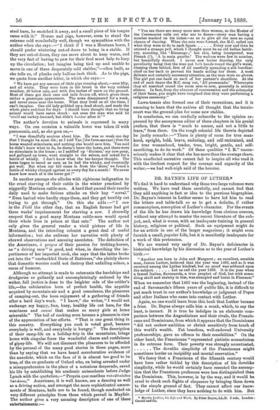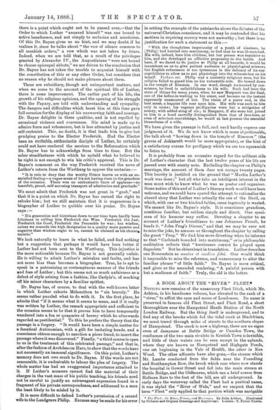DR. BAYNE'S LIFE OF LUTHER.* WE find it hard to
understand why these two large volumes were written. We have read them carefully, and cannot find that they add anything in fact or idea to the previous biographies. Dr. Bayne's interest in Luther seems to have led him to read the letters and table-talk so as to get a definite, if rather commonplace, conception of Luther's character. For the events of the life he has drawn his knowledge from obvious sources, without any attempt to master the recent literature of the sub- ject, and, what is worse, with an inadequate training in general history, religions or political. Such an equipment might d& for an article in one of the larger magazines ; it might even furnish a small, popular Life, but it is manifestly inadequate for a work of this pretension.
We are warned very early of Dr. Bayne's deficiencies in historical knowledge by his discussion as to the year of Luther's birth :—
" Another son born to John and Margaret ; an excellent, sensible man, James Luther, believed that the year was 1483, and so it was- received among the Luther kindred, but no proof was adduced upon
the subject Let us call the year 1483. It is the year when a famed Italian, Savonarola, a true prophet of God, but with some- thing shrill and shrieky in him, was strangled and burnt in Florence."
When we remember that 1483 was the beginning, instead of the end of Savonarola's fifteen years of public life, it is difficult to put much trust in our author's knowledge or judgment of Popes and other Italians who came into contact with Luther.
Again, no one would learn from this book that Luther became a friar. Dr. Bayne always calls him a monk, which, to say the least, is inexact. It is true he indulges in an elaborate com- parison between the Augustinians and their rivals, the Francis- cans and Dominicans, from which it appears that the Dominicans "did not eschew ambition or shrink sensitively from touch of this world's wealth. Fat benefices, well-endowed University professorships, gave no offence to their sensibilities." On the other hand, the Franciscans "represented pietistic monasticism
in its extreme form. Their poverty was strongly accentuated.
The dovelike simplicity of the Franciscans might sometimes border on insipidity and mental enervation."
We fancy that a Franciscan of the fifteenth century would have been rather tickled by this description of his dovelike simplicity, while he would certainly have resented the assump- tion that the Franciscan professors were less distinguished than
the Dominican. This, however, is by the way, and it would be cruel to check such flights of eloquence by bringing them down
to the simple ground of fact. They cannot affect our know- ledge of Luther, since they have nothing to do with him. But
* Martin Luther, his Life and Work. By Peter Bayne, LL.D. 2 vols. London Cassell and Co.
there is a point which ought not to be passed over,—that the Order to which Luther "annexed himself" was one bound to active beneficence, and not simply to seclusion and asceticism. Of this Dr. Bayne gives us no hint, and we may doubt if he realises it, since he talks about "the vow of silence common to all monkish orders," a vow which was not taken by friars. Indeed, when we are told that, as a result of the privileges granted by Alexander IV., the Augustinians "were not bound to choose episcopal abbots," we are driven to the conclusion that Dr. Bayne has not taken the trouble to acquaint himself with the constitution of this or any other Order, but considers that no reason why he should not make phrases about them.
These are subsidiary, though not unimportant matters, and when we come to the account of the spiritual life of Luther, there is some improvement. The earlier part of his life, the growth of his religious opinions, and the opening of his struggle with the Papacy, are told with understanding and sympathy. The dangers and difficulties which beset him at this time gave full occasion for the display of his unswerving faith and courage. Dr. Bayne delights in these qualities, and is not repelled by occasional violence and coarseness. His mind is made up to admire force and vehemence, but is less attracted by justice and
self-restraint. This, no doubt, it is that leads him to give but grudging praise to the Elector Frederick. Had the Elector been an excitable, enthusiastic disciple of Luther, he certainly could not have rendered the services to the Reformation which Dr. Bayne has to acknowledge from time to time. But the sober steadfastness with which he upheld what he believed to be right is not enough to win his critic's approval. This is Dr. Bayne's comment on the way Frederick received the news of Luther's return from the Wartbarg to oppose the sectaries :— "It is vain to deny that the worthy Prince leaves us with an un- satisfied feeling—a vague sense of his not having risen to the grandeur of the occasion. There was no enthusiastic burst of applause—no heartfelt, proud, self-accusing transport of admiration and gratitude."
We must admit that Frederick was not great in "gush," and that it is a point on which Dr. Bayne has earned the right to rebuke him ; but we still maintain that it is ungenerous in a biographer of Luther to quibble over his praise. Dr. Bayne say s : —
" His generation and historians down to our time have hardly been felicitous in calling him Frederick the Wise. Frederick the Just, Frederick the Good, Frederick the Peaceable he was ; but wisdom, unless we concede the high designation to a quality more passive and negative than wisdom ought to be, cannot be claimed as his charm, teristic."
We look naturally to learn in what he failed, and find nothing but a suggestion that perhaps it would have been better if Luther had not been sent to the Wartburg. This injustice is the more noticeable because Dr. Bayne is not generally unfair. He is willing to admit Lather's mistakes and faults, and has not more bias than becomes a biographer. True, he is apt to speak in a patronising or contemptuous manner of the friends and foes of Luther ; but this seems not so much unfairness as a defect of style arising from a fashion, like Carlyle's, of marking off his minor characters by a familiar epithet.
Dr. Bayne has, of course, to deal with the well-known letter in which Luther exhorts Melancthon. to "sin bravely." He seems rather puzzled what to do with it. In the first place, he admits that "if it means what it seems to mean, and if it really was written by Luther, the remark appropriate and sufficient to the occasion seems to be that it proves him to have temporarily wandered into a fen or quagmire of heresy which he afterwards regarded as pestilential." To this he prefers the theory that the passage is a forgery. "It would have been a simple matter for a fanatical Antinomian, with a gift for imitating hands, and a
conscience obtuse enough ta sanction a pious fraud, to insert the passage where it was discovered." Finally, "a third course is open
to us in the treatment of this celebrated passage," and that is, after the fashion of Archdeacon Hare, to show that the words have not necessarily an immoral significance. On this point, Luther's memory does not owe much to Dr. Bayne. If the words are not censurable, it is undesirable to labour the plea of forgery. The whole matter has had an exaggerated importance attached to it. If Luther's accusers cannot find the material of their charges in the vast mass of his public teaching, his friends need not be careful to justify an extravagant expression found in a fragment of his private correspondence, and addressed to a man the least likely to be misled by it.
It is more difficult to defend Luther's permission of a second wife to the Landgrave Philip. Excuses may be made for his error in setting the example of the patriarchs above the dictates of the
universal Christian conscience, and it may be contended that his motives in requiring secrecy were not unworthy ; bat there is no justification for such a statement as this :—
"With the thoughtless impetuosity of a youth of nineteen, he [Philip] had hurried into matrimony, to find that he was ill-matched. His wife, indeed, bore him children, but her person was repulsive to him, and she developed an afflictive propensity to the bottle. And here, if we dared to do justice to Philip at all hazards, it would be incumbent on us to give patient audience to physiological science; but English refinement is too tyrannous in the delicacy of its sus- ceptibilities to allow us to put physiology into the witness-box on his behalf. Verbum sat. Philip was a sincerely religions man, but his religion failed to guard him on his vulnerable side. He bowed down in the temple of Rimmon. In one word, though tormented by con- science, he lived in unfaithfulness to his wife. Such had been the state of things for many years, when he saw Margaret von der Baal, one of the ladies-in-waiting to his sister, and became on the instant supremely enamoured of her. The vision of a purer and, in the best sense, a happier life rose upon him. His wife was such to him only in name; his vagrant profflgacies were bat a mitigation of misery, with added sting of sin ; in Margaret, if she were but joined to him in a bond sacredly distinguished from that of free-love, or even of selectest concabinage, he would at last possess the essential blessedness of a wife.
We have given the passage in full, and need hardly express our judgment of it. We do not know which is more objectionable, the talk about "bowing down in the temple of Rim mon " (the groves of Ashtareth would be more appropriate), or the hint of a satisfactory excuse for profligacy which we are too squeamish to listen to.
It is probably from an excessive regard for the militant side of Luther's character that the last twelve years of his life are passed over with scanty note. Excluding the chapter on Philip's marriage, the account of them does not occupy twenty pages. This brevity is justified on the ground that "Martin Luther's work was done ;" but all who take an intelligent interest in the man must wish to know what he was as pastor and organiser.
Some notice of this and of Luther's literary work would have been welcome, and we could have spared the attempt to rationalise the absurd story that Luther was actually the son of the Devil, on which, with one or two kindred fables, some ingenuity is wasted. We cannot like Dr. Bayne's style. It is sometimes grandiose, somtimes familiar, but seldom simple and direct. One speci- men of his humour may suffice. Devoting a chapter to an account of Luther's friendliness to one Johannes Frosch, he heads it, "John Frog's Dinner," and that we may be sure not to miss the joke, he amuses us throughout the chapter by calling the guest "Frog." We find him more diverting when he informs us that " Carlstadt bounded into matrimony," or in philosophic meditation reflects that "hurricanes cannot be played upon flageolets." But he shines least in translation. Luther describes one Bossenstein as anzius et modicze fi,det. One would think it impossible to miss the reference, and unnecessary to alter the familiar phrase "of little faith." Dr. Bayne is more critical, and gives us the amended rendering, "A painful person with but a modicum of faith." Truly, the old is the better.







































 Previous page
Previous page